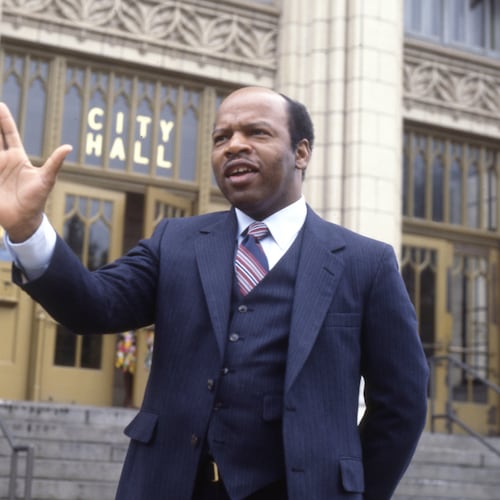The U.S. House of Representatives convened Monday morning for the first time in more than three decades without John Lewis serving as the conscience of Congress.
Watch the livestream to honor Lewis by clicking below:
Lewis, 80, died late Friday after a battle with pancreatic cancer, only hours after another civil rights legend, C.T. Vivian, died at age 95.
>COMPLETE COVERAGE: John Lewis
House leaders held a moment of silence about 11:15 a.m. before the day’s legislative business gets underway. U.S. Rep. Sanford Bishop, who is now dean of Georgia’s congressional delegation in the wake of Lewis’ passing, led the moment of silence, with House Speaker Nancy Pelosi presiding.
President Donald Trump signed a proclamation ordering flags at half-staff at the White House and all federal properties, including military bases, for Saturday only.
Pelosi directed the same for the U.S. Capitol, and Atlanta Mayor Keisha Lance Bottoms made a similar declaration for Atlanta City Hall and all other city facilities. Both of those orders are in place indefinitely.
Georgia Gov. Brian Kemp required flags to be flown at half-staff in Lewis’ honor at the state Capitol and all state buildings. That order is in place until the evening of Lewis’ yet-to-be announced funeral and burial. At a family news conference Sunday morning, Lewis’ youngest brother, Henry Grant Lewis, did not announce any funeral arrangements, which are expected to take place across Washington, D.C., Atlanta and his place of birth, Troy, Alabama.
»AJC Special Section on John Lewis
Activists, politicians from both parties and many other people touched by Lewis’ legacy mourned the congressman and pillar of the civil rights movement Saturday, lauding the strength, courage and kindness of a man whose lifelong struggle against racial discrimination took him from a bridge in Selma to the nation’s Capitol.
“As a young man marching for equality in Selma, Alabama, John answered brutal violence with courageous hope,” said former President George W. Bush. “And throughout his career as a civil rights leader and public servant, he worked to make our country a more perfect union.”
Former President Barack Obama, America’s first Black president, recalled being sworn in for his first term: “I hugged him on the inauguration stand before I was sworn in and told him I was only there because of the sacrifices he made.”
Credit: AP
Credit: AP
Lewis often recalled his upbringing in the segregated South, including how he was denied a library card because the library was for “whites only.” He was determined to destroy segregation, joining with the Rev. Martin Luther King Jr. as founder of the Student Nonviolent Coordinating Committee to help plan the 1963 March on Washington.
Two years later, Lewis helped lead the “Bloody Sunday” voting rights march intended to go from Selma to Montgomery, Alabama. White police, state troopers and thugs blocked their way on the bridge out of Selma, attacking the peaceful marchers with clubs, bullwhips and tear gas. Lewis suffered a cracked skull.
He went on to make a career in politics, representing Atlanta in Congress for more than 30 years, and all the while imploring people to press for justice — to make what he came to call “good trouble, necessary trouble.”
Bottoms described that call as “a generational rallying cry for nonviolent activism in the pursuit of social justice and human rights.”
“He fought harder and longer than anyone in our nation’s continuing battle for civil rights and equal justice,” the NAACP said in a written statement.
He also scrapped with Trump, refusing to attend his inauguration and calling him a racist.
Those mourning included baseball legend Hank Aaron, who said he and Lewis “connected to the roots.”
“By that I mean we were born and grew up in the highly racist and segregated South, in the state of Alabama,” Aaron said. “He committed his life to the struggle for justice and equality for all people.”
Democratic Sen. Kamala Harris of California noted Lewis stood not just for an end to racial discrimination but for gay rights, such as when he opposed the federal ban on gay marriage, and for immigrant rights, such as an end to family-separation policies.
Kemp praised Lewis as “a Civil Rights hero, freedom fighter, devoted public servant, and beloved Georgian who changed our world in a profound way.”
“I will never forget joining hands with John as members of Congress sang We Shall Overcome at a 2008 ceremony honoring his friend Dr. Martin Luther King, Jr.,” U.S. Sen. Mitch McConnell wrote. “It could not have been more humbling to consider what he had suffered and sacrificed so those words could be sung in that place.”
Democrats noted that McConnell had refused to bring the 2020 Voting Rights Act, passed by the House, up for a vote before the Republican-controlled Senate. The measure would restore federal oversight of state elections, after the conservative majority on the U.S. Supreme Court invalidated much of the 1965 Voting Rights Act in 2013.
Credit: Tyson Alan Horne
Harris, Massachusetts Sen. Elizabeth Warren and others urged McConnell to allow a vote, and several said it should be given a new name: the John Lewis Voting Rights Act.
Facing a tight legal deadline, Georgia Democrats are set to replace Lewis on the November ballot from a pool of more than 100 potential candidates who applied for the seat after the civil rights hero died. The Democratic Party of Georgia’s state executive committee plans to meet to decide who to nominate to represent the Atlanta-based district Lewis held since 1987, and the candidate who lands the appointment will be considered a virtual lock to win a full two-year term in November.
The Associated Press contributed to this report.
About the Author
The Latest
Featured

